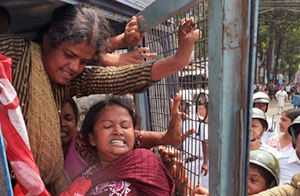New Delhi, Sep 2: Normal life in various parts of the country was partly affected today by the one-day nationwide strike by trade unions with banking, transport and coal mining being among the most impacted, while hundreds of workers were detained in Haryana, Jharkhand and West Bengal.
While some states like Kerala and Telangana were badly hit by the strike, the impact was partial in Punjab, Haryana and Maharashtra. However, life remained normal in metropolitan cities of Mumbai and Delhi.
Banking services have been affected throughout the country as public sector banks' employees largely remained off-duty. Private banks, however, continued their operations normally.
Clearing operations at Reserve Bank were hit with trade union leaders claiming that cheques totalling Rs 19,000 crore were held up as the staff did not report on duty.
"Clearing services have been impacted. Financial instrument worth Rs 19,000 crore has been held up," claimed AIBEA General Secretary C H Venkatachalam.
All India Coal Workers Federation General Secretary (CITU) D D Ramanadan said, "Dispatch, production and transport of coal have come to a standstill with operations in CIL subsidiaries BCCL, CCL, ECL and CMPDI badly hit. Around 300 workers have been arrested in Rajmahal and Chitra mines areas."
"There have been instances of arrests in West Bengal and Haryana. We came to know that 12 people have been arrested in Manesar while seven were detained in West Bengal. The strike this time has greater impact than last year's agitation on September 2," All India Trade Union Congress Secretary D L Sachdev told PTI.
He said, "Buses of Punjab Roadways and Haryana Roadways were almost off the road. More than half the buses of Uttar Pradesh Road Transport were also off the road. But DTC's buses were plying while Delhi Metro was also functional."
The strike is almost complete in Left-ruled Kerala where it got the support of Chief Minister Pinarayi Vijayan who courted controversy after supporting the strike on Facebook with BJP hitting out against him.





Comments
Add new comment